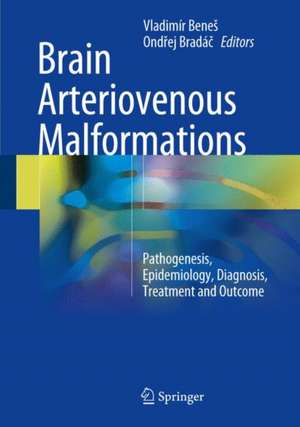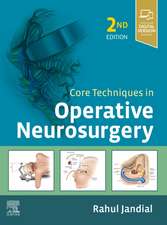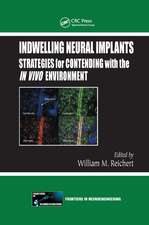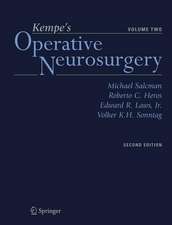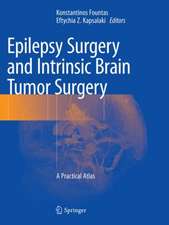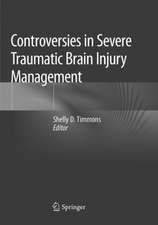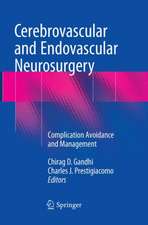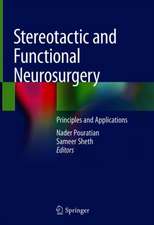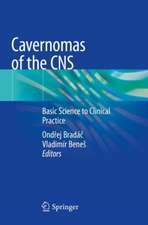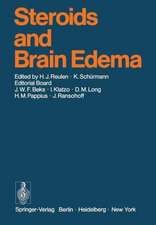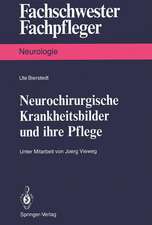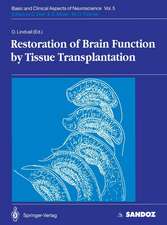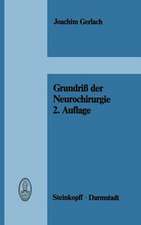Brain Arteriovenous Malformations: Pathogenesis, Epidemiology, Diagnosis, Treatment and Outcome
Editat de Vladimír Beneš, Ondřej Bradáčen Limba Engleză Hardback – 25 oct 2017
This book is written by an international group of European authors, and is aimed at neurovascular surgeons and neurosurgical residents.
| Toate formatele și edițiile | Preț | Express |
|---|---|---|
| Paperback (1) | 1027.58 lei 38-44 zile | |
| Springer International Publishing – 23 iun 2018 | 1027.58 lei 38-44 zile | |
| Hardback (1) | 1038.57 lei 38-44 zile | |
| Springer International Publishing – 25 oct 2017 | 1038.57 lei 38-44 zile |
Preț: 1038.57 lei
Preț vechi: 1093.23 lei
-5% Nou
Puncte Express: 1558
Preț estimativ în valută:
198.74€ • 208.98$ • 164.21£
198.74€ • 208.98$ • 164.21£
Carte tipărită la comandă
Livrare economică 12-18 aprilie
Preluare comenzi: 021 569.72.76
Specificații
ISBN-13: 9783319639635
ISBN-10: 3319639633
Pagini: 241
Ilustrații: VI, 241 p. 226 illus., 77 illus. in color.
Dimensiuni: 178 x 254 mm
Greutate: 0.7 kg
Ediția:1st ed. 2017
Editura: Springer International Publishing
Colecția Springer
Locul publicării:Cham, Switzerland
ISBN-10: 3319639633
Pagini: 241
Ilustrații: VI, 241 p. 226 illus., 77 illus. in color.
Dimensiuni: 178 x 254 mm
Greutate: 0.7 kg
Ediția:1st ed. 2017
Editura: Springer International Publishing
Colecția Springer
Locul publicării:Cham, Switzerland
Cuprins
Introduction.- Motivation to this study.- AVM definition and angioarchitecture.- Feeding arteries.- Associated aneurysms.- Nidus component.- Draining veins.- Genetics of arteriovenous malformations.- Epidemiology of AVM.- Physiology of arteriovenous malformations.- Arterial side.- Steal phenomenon.- Normal perfusion pressure breakthrough.- Venous side.- Occlusive hyperemia.- Compartmental model of AVM nidus.- AVM presentation.- Hemorrhagic presentation.- Morbidity and mortality of AVM related intracranial haemorrhage.- Epilepsy presentation.- Focal neurologic deficit (FND).- Natural course.- AVM grading.- Surgical AVM grading.- Radiosurgical AVM grading.- Imaging.- Catheter angiography.- Magnetic resonance imaging.- Computed tomography.- Treatment for brain AVMs.- Literature series.- Surgery.- Endovascular embolization.- Stereotactic radiosurgery.- Combined treatment.- ARUBA study comments.
Recenzii
“With this book, the authors provide a useful vade mecum of one the most challenging cerebrovascular diseases, brain arteriovenous malformation (AVM). … Intended for a young audience of specialists in the field, the book offers a synthetic picture of the current understanding and management of cerebral AVM for those who are first approaching this complex disease. … This book, encompassing different fields, provides a comprehensive knowledge base in cerebral AVM, adding a valuable resource to the current literature.” (Fady T. Charbel, Doody's Book Reviews, January, 2018)
“This is an excellent text and atlas on the most serious of neurosurgical pathologies AVMs. … I recommend this book to all practicing and academic neurologists and neurosurgeons.” (Joseph Grenier, Amazon.com, November, 2017)Notă biografică
Vladimír Beneš, MD, PhD
Prague, Czech Republic
Ondřej Bradáč, MD, MSc, PhD
Prague, Czech Republic
Prague, Czech Republic
Ondřej Bradáč, MD, MSc, PhD
Prague, Czech Republic
Textul de pe ultima copertă
This book reviews the natural course of arteriovenous malformation (AVM) disease and the active treatment modalities. These are compared with surgical and neuropsychological results achieved at the Military University Hospital, Prague, Czech Republic. Based on these comparisons, treatment recommendation for AVM is articulated. Furthermore, the long-term efficacy of different treatment is discussed.
This book is written by an international group of European authors, and is aimed at neurovascular surgeons and neurosurgical residents.
This book is written by an international group of European authors, and is aimed at neurovascular surgeons and neurosurgical residents.
Caracteristici
Explains brain arteriovenous malformation pathology Introduces the authors’ approach to making a treatment decision Discusses some AVM cases in detail to aid understanding
